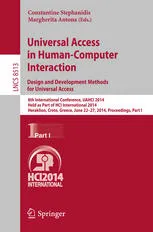Universal Access in Human-Computer Interaction. Design and Development Methods for Universal Access: 8th International Conference, UAHCI 2014, Held as Part of HCI International 2014, Heraklion, Crete, Greece, June 22-27, 2014, Proceedings, Part I
4.0
Reviews from our users

You Can Ask your questions from this book's AI after Login
Each download or ask from book AI costs 2 points. To earn more free points, please visit the Points Guide Page and complete some valuable actions.Introduction to the Book
Universal Access in Human-Computer Interaction (HCI) is a pivotal theme in the realm of interaction design, aiming to make technology accessible to all individuals, regardless of their abilities or backgrounds. The 8th International Conference, UAHCI 2014, convened in Heraklion, Crete, as part of the HCI International 2014, represents a profound exploration of this theme. This book, which compiles the proceedings, specifically focuses on the design and development methods that promote universal access, embodying the interdisciplinary discussions and innovations showcased at the conference.
Detailed Summary of the Book
The volume serves as Part I of the proceedings from UAHCI 2014, gathering a collection of research papers, case studies, and reviews from leading experts in the field. These contributions address the multifaceted challenges and solutions associated with universal access in HCI. The book emphasizes methodological advances in designing interfaces that accommodate diverse user needs, including those of individuals with disabilities, older adults, and culturally diverse populations. It delves into user-centered design approaches, highlighting innovative techniques and practices that ensure accessibility and usability across a spectrum of devices and contexts. Furthermore, the book discusses the integration of inclusive design principles in emerging technologies, offering insights into adaptive interfaces, multimodal interaction, and personalization strategies.
Key Takeaways
- Embrace diverse user experiences and requirements in the HCI design process.
- Incorporate adaptive and personalized interfaces to cater to individual user needs.
- Utilize user-centered design methodologies for developing universally accessible technologies.
- Focus on creating inclusive digital solutions that transcend abilities and cultural differences.
- Explore the potential of new interaction modalities to enhance accessibility, like voice and gestural input.
Famous Quotes from the Book
"Universal access is not merely a technical challenge; it is fundamentally about empathy and understanding the diversity of human capabilities."
"In the quest for technology that is inclusive and accessible, we are challenged to rethink traditional design paradigms and embrace innovative solutions."
Why This Book Matters
Universal Access in Human-Computer Interaction is more than a comprehensive examination of design methods; it is a call to action for designers, researchers, and stakeholders in technology development. As digital interactions become increasingly embedded in everyday life, ensuring these experiences are accessible to everyone becomes imperative. This book provides a critical foundation for understanding and implementing the principles of universal design. It is an essential resource for anyone involved in creating digital experiences that are not only functional but also inclusive and equitable. By capturing and sharing the insights from UAHCI 2014, this volume helps push the boundaries of what is possible in accessible design and encourages a broader understanding of the importance of inclusion in technology.
Free Direct Download
You Can Download this book after Login
Accessing books through legal platforms and public libraries not only supports the rights of authors and publishers but also contributes to the sustainability of reading culture. Before downloading, please take a moment to consider these options.
Find this book on other platforms:
WorldCat helps you find books in libraries worldwide.
See ratings, reviews, and discussions on Goodreads.
Find and buy rare or used books on AbeBooks.
1177
بازدید4.0
امتیاز50
نظر98%
رضایتReviews:
4.0
Based on 0 users review
"کیفیت چاپ عالی بود، خیلی راضیام"
Questions & Answers
Ask questions about this book or help others by answering
No questions yet. Be the first to ask!


